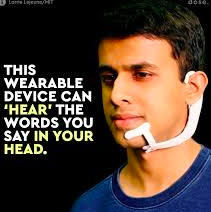MIT Tech Labs

A Potential Prototype
October 16, 2018
Imagine being able to know anything you wanted in the blink of an eye. You could find the score to every sports game in history in under a minute. How about knowing the answer to every math question on your AP Exam without having to think about it? The possibilities would be endless if only such a thing existed, but does it? As more technology becomes available each day, new inventions have also become more frequent. One place that strives to make these impactful ideas into tangible items is the technology lab at Massachusetts Institute of Technology. Here, students bring remarkable designs to professors who approve them for production. These designs can range from sleep tracking robots to plants without soil and everything in between.
Recently, an upcoming project was featured on the news program 60 Minutes called the AlterEgo. This creation looks similar to a headset and reads nervous signals from the head. First, a question must be asked to the person wearing the device. Then, it deciphers the question asked it and forwards it to Google. In simplest terms, it can answer any question asked with the help of Google. Afterward deciphering the question, the device computes the answer using Google and sends it into the user’s brain through vibrations in the ear canal. Using this tool, the user can answer any question asked in a matter of a few seconds. This headset combines the power of Google with brain power and gives the user access to a wealth of information. A few decades ago, the most basic stage of Google Maps was created at this same lab and was originally called the “Backseat Driver”. Navigation via computer was a crazy possibility at that time, but the professors and students worked with each other to achieve the impossible.
At this lab, new ideas are being put to use every day, and the future is being created by the genius students of the new generation.